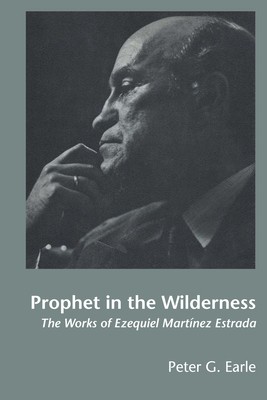
- We will send in 10–14 business days.
- Author: Peter G Earle
- Publisher: University of Texas Press
- ISBN-10: 0292718381
- ISBN-13: 9780292718388
- Format: 15.2 x 22.9 x 1.6 cm, softcover
- Language: English
- SAVE -10% with code: EXTRA
Reviews
Description
A universal test of great writers is the quality of their response to the human dilemma. Prophet in the Wilderness traces the development of that response in the works of the Argentine writer Ezequiel MartÃnez Estrada, from the first ambitious poems to its definitive expression in the essays and short stories. His theme is progressive disillusionment, in history and in personal experience, both of which are interpreted in his work as accumulations of error. Modern civilization, he believes, has created many more problems than it has solved. Like Schopenhauer, Freud, and Spengler, the three thinkers who influenced him most, MartÃnez Estrada found in real events and circumstances all the symbols of disenchantment. Many today have begun to share this disenchantment, for since the publication of X-Ray of the Pampa in 1933 the real world has become more and more like his symbolic world. Prophet in the Wilderness examines MartÃnez Estrada's foremost concern: the world as a complex reality to be discovered behind the image of one's own most intimate community. For him, the community assumed many forms: Buenos Aires, the enigmatic metropolis; the cathedral in his story The Deluge; the innumerable family of Marta Riquelme; Argentina itself in his masterpiece, X-Ray of the Pampa. MartÃnez Estrada is the great solitary of Hispanic American literature, independent of all fashions and trends. With Borges, he had become by 1950 one of the two most discussed writers in Argentina.
EXTRA 10 % discount with code: EXTRA
The promotion ends in 18d.14:36:47
The discount code is valid when purchasing from 10 €. Discounts do not stack.
- Author: Peter G Earle
- Publisher: University of Texas Press
- ISBN-10: 0292718381
- ISBN-13: 9780292718388
- Format: 15.2 x 22.9 x 1.6 cm, softcover
- Language: English English
A universal test of great writers is the quality of their response to the human dilemma. Prophet in the Wilderness traces the development of that response in the works of the Argentine writer Ezequiel MartÃnez Estrada, from the first ambitious poems to its definitive expression in the essays and short stories. His theme is progressive disillusionment, in history and in personal experience, both of which are interpreted in his work as accumulations of error. Modern civilization, he believes, has created many more problems than it has solved. Like Schopenhauer, Freud, and Spengler, the three thinkers who influenced him most, MartÃnez Estrada found in real events and circumstances all the symbols of disenchantment. Many today have begun to share this disenchantment, for since the publication of X-Ray of the Pampa in 1933 the real world has become more and more like his symbolic world. Prophet in the Wilderness examines MartÃnez Estrada's foremost concern: the world as a complex reality to be discovered behind the image of one's own most intimate community. For him, the community assumed many forms: Buenos Aires, the enigmatic metropolis; the cathedral in his story The Deluge; the innumerable family of Marta Riquelme; Argentina itself in his masterpiece, X-Ray of the Pampa. MartÃnez Estrada is the great solitary of Hispanic American literature, independent of all fashions and trends. With Borges, he had become by 1950 one of the two most discussed writers in Argentina.


Reviews